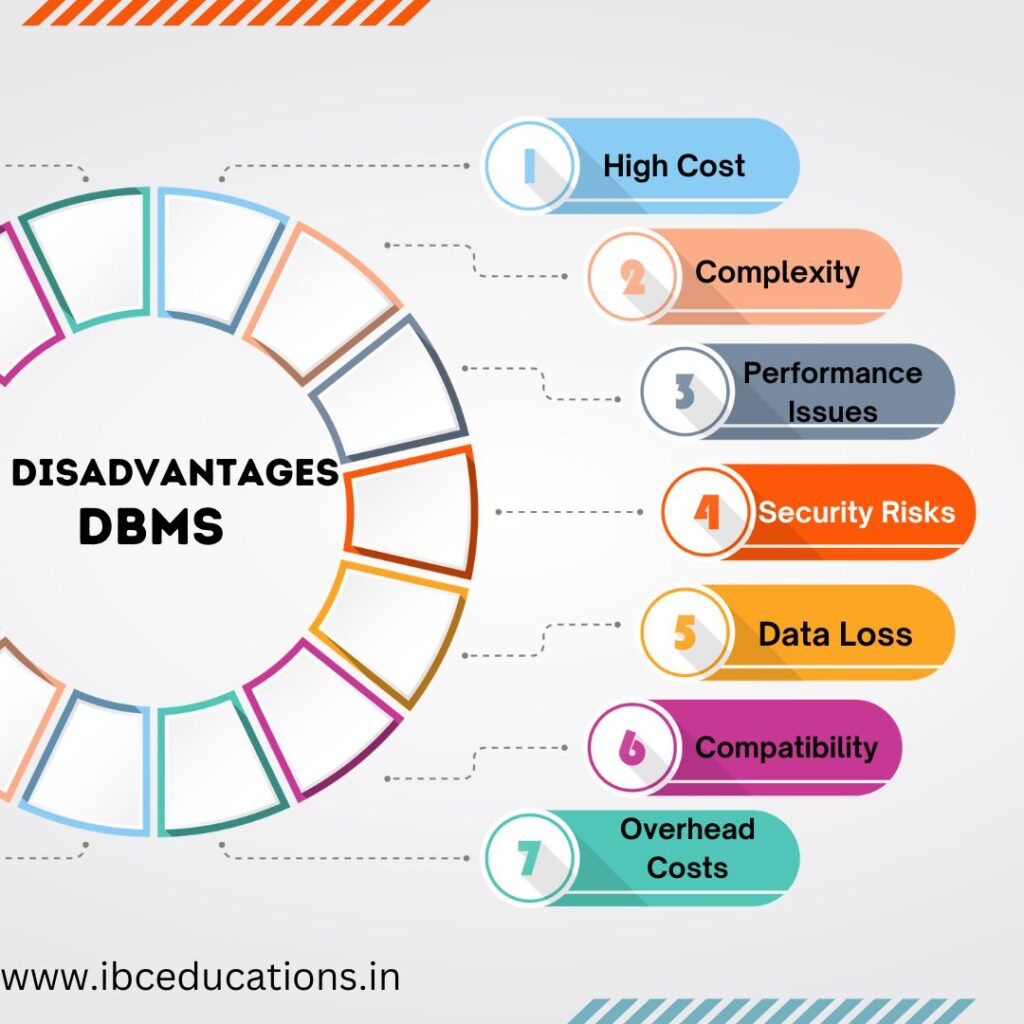DBMS (Database Management System):
Software called database management systems (DBMS) is used to safely store and retrieve user data. It is made up of numerous software applications that utilize the database. Once the DBMS has acknowledged the application’s request for data, it informs the OS to provide the desired data. A database management system (DBMS) enables users and other third-party applications to store and retrieve data in large systems.
DBMS users can design databases to suit their own requirements. The phrase “DBMS” refers to both application programs and database users. It offers a channel of communication between the software and the data. Let us examine a simple example, that of a university database. This database maintains student, course, and grade data in the context of a university. The structure of the database consists of five files:
Advantages and Disadvantages
Software called a Database Management System (DBMS) aids in the structured and ordered management of data. It enables effective data creation, retrieval, updating, and management for users.
Advantages of DBMS:
- Data Redundancy Control: Data Redundancy means removing duplicate data.Data is kept centrally in a database management system (DBMS). By doing this, needless data duplication is removed. Example: In a university system, the same student data is used in multiple departments (admissions, exams) without needing to store it separately for each.
2. Data Organization: Information can be easily found and retrieved thanks to the structured data that a DBMS helps to store and manage. For instance, you can easily locate all of a student’s information in a school database by just searching for their ID.
3. Data Security: Data security is ensured by a database management system (DBMS), which restricts access to authorized users only. Sensitive information is safeguarded since passwords and permissions can be changed.
4. Data Integrity: Accuracy and consistency of the data are guaranteed by DBMS. For instance, the DBMS will immediately update all data, everywhere, if a product’s price changes, making sure that no outdated or inaccurate information is left.
5. Efficient Data Access: DBMS enable quick data retrieval through querying. It is effective for businesses since, for instance, you can quickly look for all sales from the previous month or filter products by category.
6. Backup and Recovery: A database management system (DBMS) makes automatic data backups so that you may easily retrieve your data in the event of a system failure or corrupted data.
7. Multiple Users: There is no conflict when multiple users are trying to access the database at once. In large businesses, this is useful since different departments could need to access the same data at the same time.
8. Improved Data Sharing: Data can be transferred between many apps or departments thanks to a database management system (DBMS). To guarantee that everyone is in agreement, a company’s HR and Finance departments, for instance, can access the same employee database.
9. Scalability: You may simply add more data or features to your database as your company expands without having an impact on its functionality.
10. Customizable Reports: Using a DBMS, you can design reports that are specific to your requirements. You can, for example, create a report listing every consumer who made a purchase the previous year.
In summary, database management systems (DBMS) facilitate, secure, and optimize data processing for both individuals and companies.
Disadvantages of a Database Management System (DBMS)
- High Cost: A DBMS’s implementation and upkeep might be costly. The software itself can be very expensive, and strong hardware and skilled staff are also required for system management.
- Complexity: DBMS systems are frequently complicated and need to be operated by qualified specialists. Small firms may find it challenging to acquire the necessary knowledge and skills for designing, installing, and maintaining a database system.
- Performance Issues: Performance may occasionally suffer from system slowdown brought on by numerous users executing sophisticated queries or concurrently accessing the database.
- Increased Security Risks: Even while database management systems (DBMS) offer security protections, putting all of your data in one place increases the risk of cyberattacks. Hackers may be able to access private information if the system is not adequately secured.
- Regular Maintenance: Regular backups, upgrades, and maintenance are necessary for DBMSs. This increases the workload for operations and can need hiring specialized workers to make sure everything goes as planned.
- Data Loss Risk: Even if a database management system (DBMS) provides backup and recovery capabilities, a system failure could cause considerable data loss if the backup system also fails.
- Compatibility Issues: It can occasionally be challenging to integrate an existing DBMS with other programs and systems. Inadequate software integration may result in issues with sharing and accessing data.
- Learning Curve: Effective use of a DBMS frequently necessitates training staff members on new procedures and tools, which can take time and initially slow down operations.
- Vendor Dependence: Since many DBMS systems are provided by particular vendors, you may find yourself depending on them for customizations, updates, and support. Changing suppliers can be costly and challenging.
- Overhead Costs: Running a database management system (DBMS) has recurring expenses that can build up over time. These expenses include support staff, server electricity, and licensing fees.

In conclusion, a database management system (DBMS) has numerous benefits, but it also has drawbacks, including expense, complexity, and security threats.
